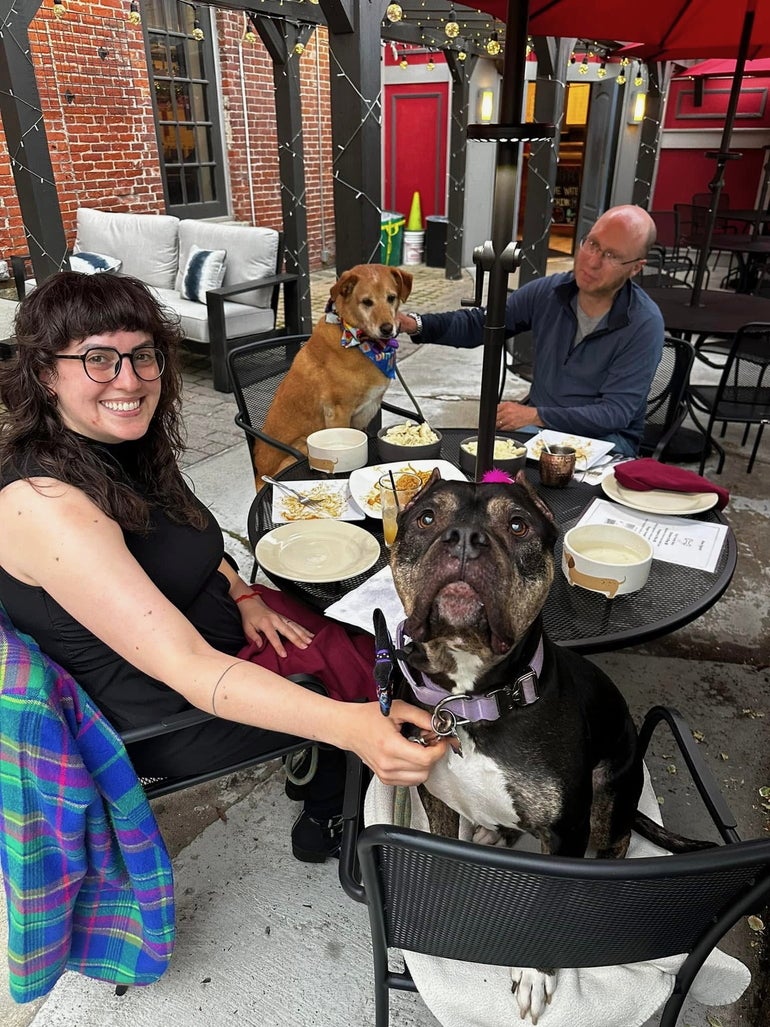Suddenly, more and more owners are looking to companies to offer both more enriching services for their four-legged friends.
Get Instant Access to This Article
Subscribe to Worcester Business Journal and get immediate access to all of our subscriber-only content and much more.
- Critical Central Massachusetts business news updated daily.
- Immediate access to all subscriber-only content on our website.
- Bi-weekly print or digital editions of our award-winning publication.
- Special bonus issues like the WBJ Book of Lists.
- Exclusive ticket prize draws for our in-person events.
Click here to purchase a paywall bypass link for this article.
Dogs have not always been thought of as the companions they are today.
Many historians credit the Victorians in the 19th century for redirecting Western societal views of domesticated dogs from workers to members of the household, according to research reported by the University of Cambridge and TIME.
Since then, pet humanization, especially that of dogs, has been steadily trending upward. In fact, the rise in pet humanization is driving increased American spending on both grooming and overall well-being services for their pets, an annual total expected to reach $15.8 billion by 2029, according to a report published by Research and Markets, a Dublin-based market analysis provider.
For Central Massachusetts business owners, they’ve only seen that fixation compounded by the COVID-19 pandemic. Suddenly, more and more owners are looking to companies to offer both more enriching services for their four-legged friends and expanded accommodations to bring their dogs with them throughout the region.
That’s not necessarily a bad thing. Indeed, quite the opposite.
As Worcester County businesses adapt to serve dogs and meet the needs of their adoring owners, they’re seeing growing customer satisfaction in what is arguably the most pro-dog era to date.
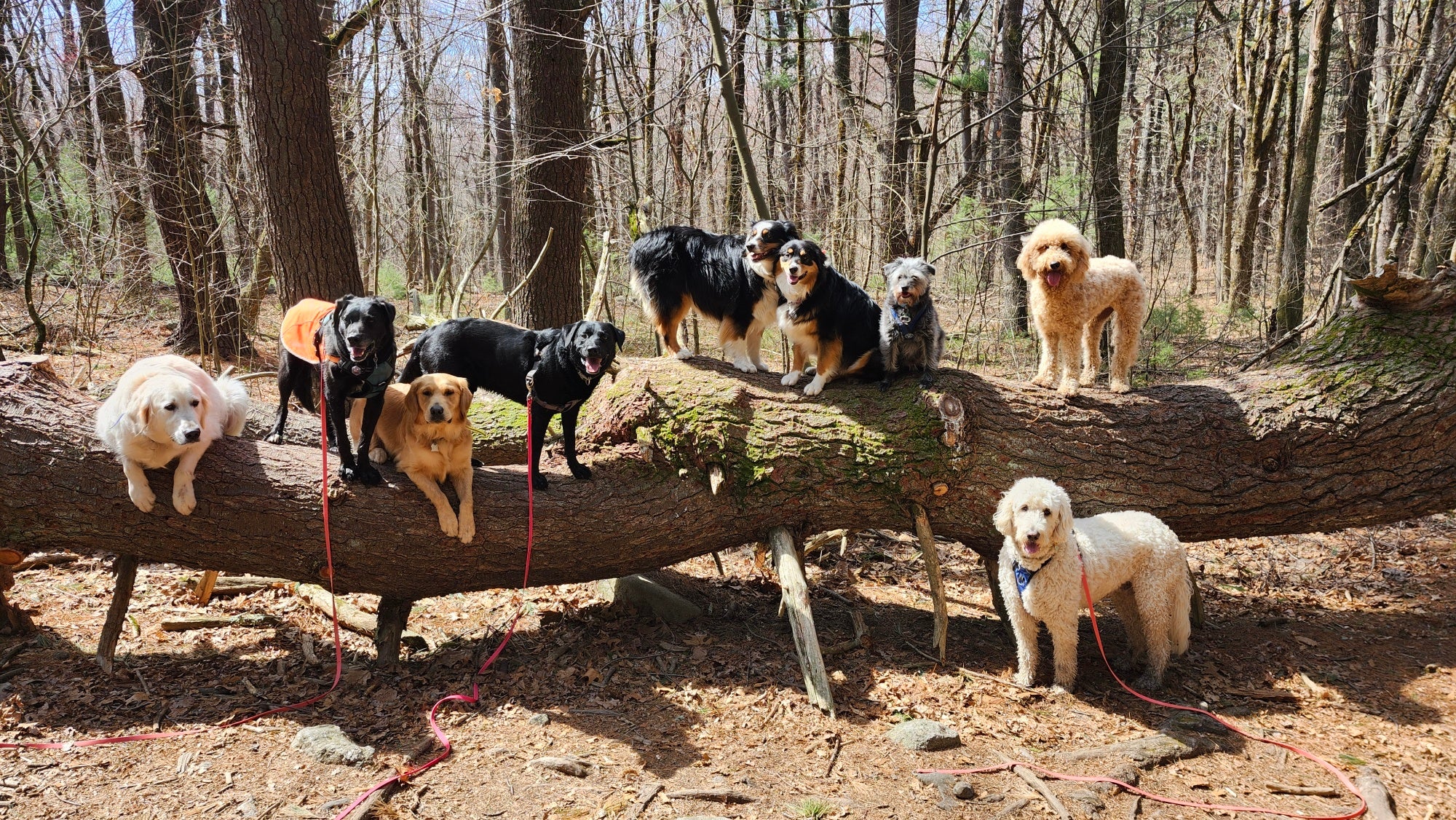
Dogs welcome!
Chinese restaurant Nancy Chang in Worcester has almost always allowed for dogs to sit outside with their owners, but the option just wasn’t that widely advertised until 2020, said Owner Shawn Tang.

“It's a norm that started during the pandemic: the companionship, of especially singles, families without kids, that want that extra attachment, that relationship,” said Tang.
In fact, 97% of U.S. pet owners report viewing pets as just as much a part of their family as their human members, according to a 2023 study by the Pew Research Center. As of 2024, dogs were the most popular pet in the United States with 65.1 million households owning a dog out of the 86.9 million homes that owned any pet, according to 2025 statistics published by Forbes.
As more customers came to Nancy Chang to dine outside due to COVID regulations, the restaurant began to see more patrons arriving with their dogs in tow. Responding to the demand, Nancy Chang began offering a dog menu, with chicken and rice for $8, veggies and rice for $6, and a veggie omelet for $10.
“How good is it if you can drink and be outside, and keep an eye on your dog and [have] something for the dog to snack on?” said Tang.
Dog owners in general just don’t want to be without their pets, said Joe Weiss, owner of the Worcester coffee shop and bar New Tradition.
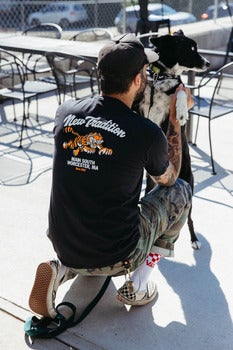
“A lot of people just want to be with their pets 24/7, especially after COVID where people had two years to be with their dogs, and I feel like [they] just didn't want to give that up,” said Weiss.
Weiss and his business partner Jason Roche have always allowed dogs into New Tradition since they opened in 2018. The duo were inspired to do so based on their own love of dogs, and the decisions helped set the soil for a blooming community.
“We have daily regulars, that I think if we stopped allowing that, they certainly would not be coming in every day,” he said.
The shop even had a regular who would bring his two golden retrievers and his cat Tito to New Tradition, the latter of whom would sit on a bar stool and watch him play darts.
“After COVID, I don't know if it was a mutual separation anxiety, but people didn’t want to spend a second apart,” said Weiss.
Now, not a day goes by where New Tradition doesn’t see at least four or five dogs, and Weiss doesn’t see that trend slowing down for his business or for others.
“My generation and younger, I feel like a lot of people are choosing to not have children, and there's sort of replacement with dogs and other pets,” he said.
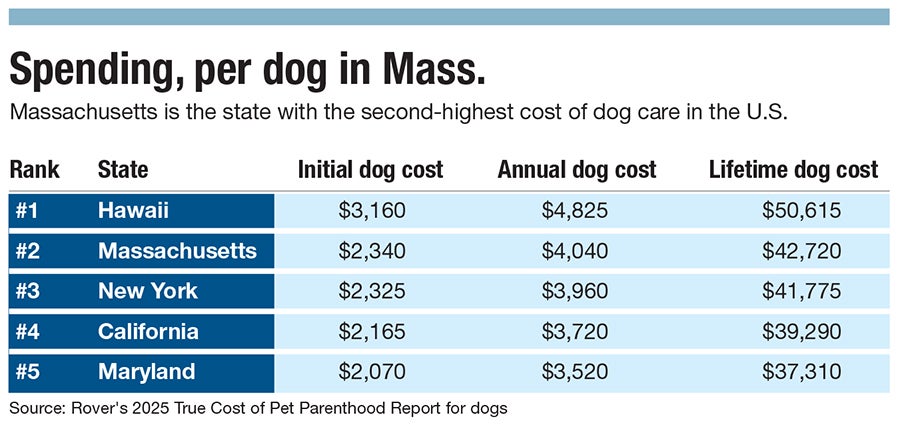
Enrichment sells
Before she opened A Bark Above Dogventures, a Worcester-based dog adventure and training company, Marina Theberge was working in finance until she realized she could make a business out of her daily two-hour dog hikes.
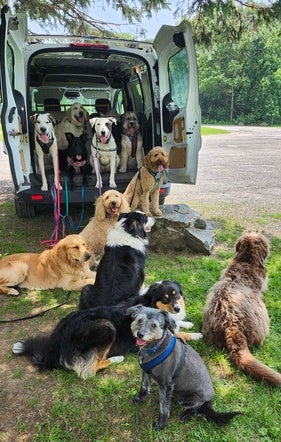
Starting with just a handleful of clients in January 2022, Theberge has grown A Bark Above’s clientele to about 60 throughout the company’s service offerings. While today she offers around-the-block walks, what always has and continues to be the number one seller is her signature two-hour nature hikes. They come with pick up and drop off transportation services, which was far from a common service offering not that long ago.
“When I was a child, most dogs were backyard dogs,” said Theberge. “Now … some people … they see their dogs as like their kids.”
She’s observed a pivot in many owners' preferences toward enrichment and wanting for their dogs to experience physical and mental stimulation: an uncommon concept just a few years ago, she said.
“They're like ‘Oh my God, while I'm at work, my dog is having fun. They're safe. They're socializing. They're going to be tired, more content, happy,’” said Theberge.
These dogventures allow for dogs to have their own social circles, she said. It’s another trend she’s seeing rise in tandem with personalized care, hence A Bark Above’s multiple walking, training, and boarding offerings.
“That's really what it comes down to; they're just happy to know that their dog is not sitting at home and not sitting at a daycare on a couch,” said Theberge.
Another business owner who has seen similar companies come to surface after his is Brew Biscuits, owned by Chris Yurkus.

Founded in May 2021, Brew Biscuits in Holden makes dog treats using spent grains sourced from local brewers and distillers.
Yurkus came up with the idea to utilize the spent grain while homebrewing with friends during the pandemic. He started off by feeding the homemade treats to his dogs, then dispersing them to fellow owners on dog walks before he recognized a real business plan was starting to unfold.
Today, he partners with about 20 breweries and three distilleries and sells at pet stores, farms, and craft vendors in addition to direct to consumers.
“When I first started four years ago to today, there's definitely way more people doing dog treats of some fashion that weren't doing it before,” said Yurkus.
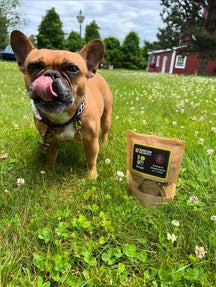
He attributes this growth in part to the success of dog treat businesses like his, companies that stoke the flames for others who are making at-home dog snacks.
“And there's room for them,“ he said.
Yurkus sees Millennials and Gen Zers more likely to buy-in to his product, in part because of its focus on upcycling waste and sustainability.
Older adults can often be a harder sell. They can seem averse to purchasing more expensive dog treats, feeling the product is more expensive than what they’re used to paying and reminiscing about the days their dogs would just eat table scraps. Yet, even with that demographic, the tides are starting to turn.
“So they exist, but it's really kind of even turning with those folks. The amount of grand dog parents that I sent biscuits to because they're buying them for their grand puppy is … it's shocking,” he said.
Mica Kanner-Mascolo is a staff writer at Worcester Business Journal, who primarily covers the healthcare and diversity, equity, and inclusion industries.
